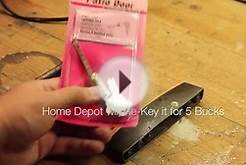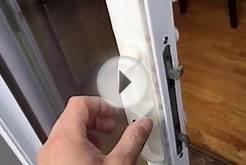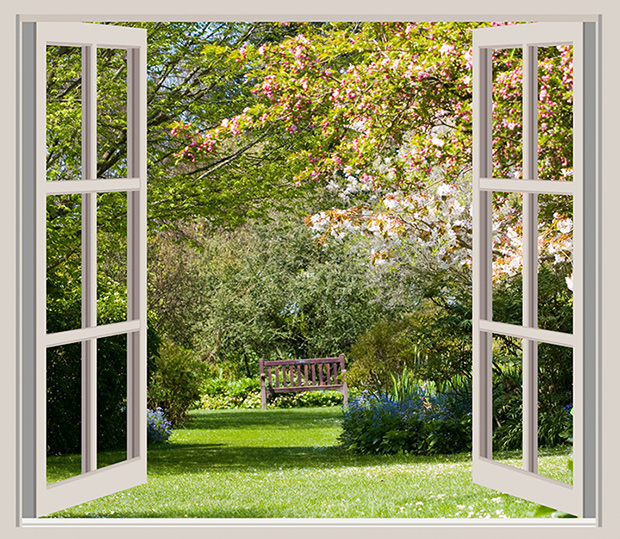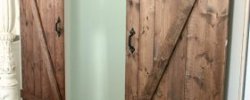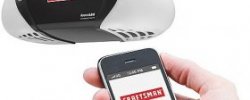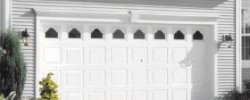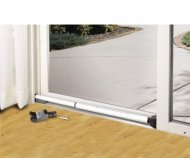 That large, sliding glass patio door that you love because it lets in so much natural light? Yeah, burglars love them, too.
That large, sliding glass patio door that you love because it lets in so much natural light? Yeah, burglars love them, too.
- Are often unlocked. In his experience, people often forget to lock the back sliding glass doors.
- Have locks that are easy to “pick”. Even if they are locked, many can be unlocked simply by jiggling the handle. (Here’s a video demonstration.)
- Advertise what’s in your home. Those large windows make it easy to see all the great stuff you have that burglars want.
- Are in your backyard. In the back yard, there’s less chance of being seen by neighbors or passersby.
- Are made of glass. If all else fails, glass breaks pretty easily. And since sliding glass doors are tempered glass for safety, burglars don’t have to worry about getting cut.
So what’s one to do? Board up the sliding glass door permanently? Replace it with large, locking steel doors? Both are options, though not great ones.
Below, we’ll show you the 3 ways burglars break in through your sliding glass door and how you can prevent or deter each one.
What you can do
Install a better sliding glass door lock. You have a lot of options, but here are the best ones we recommend:
Security bars
Security bars are strong metal bars that attach to one side of the door frame and then are extended or folded into place and brace against the sliding door to lock it into place.
You can create something similar yourself. Cut a dowel or piece of 1x1 wood to the width of your tracks when closed. Then place the brace in the tracks to “lock” the door.
Traditional sliding door locks
The most common type of sliding door lock is a basically a bolt that attaches to the sliding door. When shut, the bolt slides up into the frame of the door to secure it. A key then locks the bolt in position.
Double bolt locks
This is a newer type of sliding door lock. Double bolt locks are 2 pieces. One piece attaches to the frame of your door. The other attaches to the sliding door. When shut, the piece that attaches to the frame nests inside of the piece that attaches to the door. Metal bolts then slide into the piece attached to your frame to secure the door.
Door sensors
While not a substitute for a good lock, door sensors help keep your family and belongings safe. When the door is opened, they will trigger your alarm. And a sounding alarm can be enough to scare off some burglars because they don’t want attention called to what they’re doing.
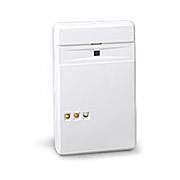 A Honeywell wireless door/window contact sensor
A Honeywell wireless door/window contact sensor
2. Lifting the door out of its frame
Another way burglars break in through your sliding door is by physically lifting the door. Using a crowbar, burglars can actually lift up the door, move it off the tracks and out of the way.
How’s this possible? Well, this is how the door was put into the frame when it was made. The burglars are just reversing the process.
Install a better sliding glass door lock. (Sound familiar?) With the exception of the security bars, all the options listed in the first section also work well to prevent thieves from just lifting the door out of its frame.
3. Breaking the glass
Even with the best door lock and working door sensors a thief can still break in through your patio door simply by breaking the glass. “Won’t that make a lot of noise?” you might be thinking.
Sure, but if you’re not home they’ll still get a bunch of stuff before anyone gets there. Plus, if they see something they really want and think they can get in and out quickly, they may simply smash the glass, grab it, and go—even if you’re home.
Glass is always going to be a weak point in your home’s security system. But here are some ways to strengthen it:
Replace your door with an impact-resistant sliding door
Many door and window companies make impact-resistant or “hurricane-proof” sliding doors that cannot be easily broken. However, they are expensive, heavy and difficult to install.
Window film
Security window film is a thin, protective sheet that can be applied to glass to make it more difficult to break through. It won’t make your sliding doors impenetrable. But it can make your home a more difficult target and give more time for authorities to get there, especially when paired with a glass-break sensor (below).
Glass-break detectors
Glass-break detectors will sound your security system’s alarm when glass is broken in your home. Just like with door sensors, a sounding alarm can be enough to scare off some burglars.
“When they see that glass break [sensor] attached to that window, they know that this is a well-secured home. Stay away from it."
We suggest installing dual-tech glass-break detectors. A traditional acoustic glass-break detector senses the frequency of glass breaking and sounds your security system’s alarm.
However, that can lead to false alarms if, let’s say, a glass vase drops. Dual-tech glass-break detectors combine acoustic glass-break technology with shock glass-break technology.
That means the detectors must sense both the frequency of glass breaking and the shock against your window before setting an alarm off, reducing false alarms.

